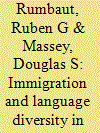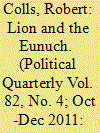| Srl | Item |
| 1 |
ID:
125148


|
|
|
|
|
| Publication |
2013.
|
| Summary/Abstract |
While the United States historically has been a polyglot nation characterized by great linguistic diversity, it has also been a zone of language extinction in which immigrant tongues fade and are replaced by monolingual English within a few generations. In 1910, 10 million people reported a mother tongue other than English, notably German, Italian, Yiddish, and Polish. The subsequent end of mass immigration from Europe led to a waning of language diversity and the most linguistically homogenous era in American history. But the revival of immigration after 1970 propelled the United States back toward its historical norm. By 2010, 60 million people (a fifth of the population) spoke a non-English language, especially Spanish. In this essay, we assess the effect of new waves of immigration on language diversity in the United States, map its evolution demographically and geographically, and consider what linguistic patterns are likely to persist and prevail in the twenty-first century.
|
|
|
|
|
|
|
|
|
|
|
|
|
|
|
|
| 2 |
ID:
108315


|
|
|
|
|
| Publication |
2011.
|
| Summary/Abstract |
The Lion and the Eunuch challenges the failures of British politicians to adequately understand the complexities, and the subtleties, of British national identity, and goes on to define it for them. It also explains reasons for our current confusions over who we are in the world. In 1940 Orwell wrote The Lion and the Unicorn as a rallying cry for a richly identifying country that was still able to imagine itself, and re-imagine itself, as the need arose. This essay suggests that without a radical change of government policy and thought, that power will continue to decline with far reaching consequences for the peoples of these islands.
|
|
|
|
|
|
|
|
|
|
|
|
|
|
|
|